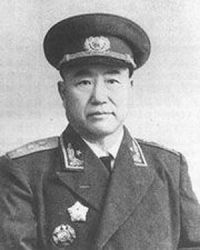Dong Qiwu
Dong Qiwu (董其武) was a general in the People's Liberation Army of China (PLA). Dong was born on Nov. 27, 1899 (Oct. 25 of the lunar calendar) to a poor family and lived in Hejin County, Shanxi province. Influenced by the ideology of the bourgeois democratic revolution, Dong made up his mind at an early age to save the country and the people.
In 1919, he went to Taiyuan City and was admitted to the "Students Soldier Corps," also called Binye Middle School.
General Dong started his army life in 1924 when he joined the second troop of the National Revolutionary Army under the leadership of Hu Jingji. In the autumn of 1928, he rendered his services to the troops led by General Fu Tso-yi, being appointed as captain, major and then director of a political training institute for cadres, successively. In 1931, he was appointed as the regimental commander of the 35th troop garrisoned in Suinan.
After the Mukden Incident of 1931, Dong Qiwu supported the "Stop the civil war and unite against Japan" initiative, the call put forward by Communist Party of China. In the face of Japanese imperialist aggression, he actively made preparations and waited for the opportunity to launch an attack against Japanese invaders.
In May 1933, Dong led the troops to join the war in defense of the Great Wall. They stuck to their posts and fought back dozens of furious attacks by Japanese invaders. But once the Tanggu Armistice Agreement was signed, they were forced to withdraw from the battlefield.
In 1936, in the Suiyuan Campaign led by General Fu Tso-yi, Dong and his army wiped out the Japanese puppet troops in the Honggeertu area by making a surprise move, which laid the foundation for the victory of the Bailingmiao Battle. Dong Qiwu was acclaimed as an anti-Japanese national hero.
After the Marco Polo Bridge Incident, he led the army in working closely with the Eighth Route Army and joining the famous Battle of Pingxingguan and Battle of Xinkou, achieving brilliant results. At the end of 1937, as division commander of the 101st troop, he and his army fought in northwest Shanxi. During this period, he got acquainted with some leaders of Eighth Route Army, such as He Long, Nan Hanchen and Cheng Zihua, which made him fortify his conviction of KMT-CPC cooperation.
In 1938, he led his troops in joining the Suinan Campaign, and at the end of the year, following General Fu Tso-yi, he came back to the Suiyuan area and looked for the proper opportunity to once again fight against Japanese invaders. In the winter of 1939, he and his army won the Baotou Battle, Suixi Battle and Wuyuan Battle, which dealt a mortal blow to the Japanese imperialists and encouraged the spirit of Chinese anti-Japanese national salvation.
Starting from the year of 1940, he insisted on continuing to fight against Japanese invaders.
At the end of 1946, Dong Qiwu became chairman of the KMT Suiyuan provincial government and commander of the Suiyuan province security. He was later appointed as the vice executive officer of Northwest Military and Political Commission. During this time, he insisted on supporting the political opinion of peace and democracy, actively expanded production, brought the Yellow River under control, improved people's livelihood, attached great importance to education, and called for unity between Mongolian and Hans.
After the peaceful liberation of Peking in January 1949, Dong seized the situation and accepted the call of peacefully resolving the Suiyuan problem put forward by the CPC and Chairman Mao Zedong without any hesitation. With the help of General Fu Tso-yi, he led Suiyuan military personnel in overcoming many obstacles to stage a rebellion and accepted the leadership of the Chinese Communist Party, making a significant contribution to cracking down the remnants of the Kuomintang government and building the foundation for the People's Republic of China.
After the founding of the People's Republic of China, he was appointed as the vice chairman of the Suiyuan Military and Political Committee, chairman of the Suiyuan Provincial People's government, deputy commander of the Suiyuan Military Region of the PLA and commander of the 23rd military unit of the PLA.
After 1953, as the commander of the 69th troop of the PLA ground forces, Dong committed himself to the modernization and regularization of armed forces. He organized many different kinds of military exercises and led the army in successfully completing military training tasks and defense construction. In 1963, Hebei province suffered from severe floods, so he traveled there and conducted the fight against floods in person.
He was the deputy to the first, second and third National People's Congress; a member of the Standing Committee of the fourth and fifth National People's Congress; a member of the Commission of Legal Affairs; a member of the Committee for Revision of the Constitution; a member of the first CPPCC National Committee; a member of the third and fourth CPPCC Standing Committee; vice chairman of the fifth and sixth CPPCC; and a member of the first, second and third National Defense Council.
In 1955, He was awarded the rank of General and the Liberation Medal 1st class. Then, in 1988, he was awarded the Meritorious Honorable Medal.
On March 3, 1989, at 13:55 p.m., Dong Qiwu died in Beijing at the age of 90.
